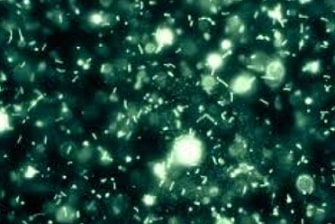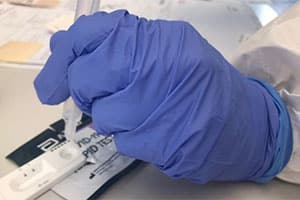 An antigen is a substance that, when introduced into an organism, triggers a defensive reaction . In this way, antigens can produce antibodies , used by the immune system for the identification and neutralization of viruses, bacteria and other pathogens.
An antigen is a substance that, when introduced into an organism, triggers a defensive reaction . In this way, antigens can produce antibodies , used by the immune system for the identification and neutralization of viruses, bacteria and other pathogens.
Antigens are usually molecules that, once arranged inside the body, cause the immune system (also known as the immune system ) to generate antibodies. This is because, by recognizing the antigen as something foreign , it fights it.
Bacterial or virus molecules can act as antigens that, in the body, bind to specific antibodies. For the immune system, the antigen poses a threat and therefore acts accordingly.
Sometimes antigens are formed in the body itself, as in the case of bacterial or viral toxins . There are also antigens that come from the environment. Therefore, a differentiation can be made between endogenous antigens and exogenous antigens .
In other words, the origin of the antigens gives rise to a classification. Exogenous are those that enter the body, that is, they come from outside. To do this, they use ingestion, an injection or inhalation. Generally, the immune system's response to this type of antigens does not manifest itself through symptoms.
Exogenous antigens are received by presenting cells (known by the acronym APCs ) through the mechanism called endocytosis and are then processed into small parts, which are then passed to helper T lymphocytes. These are activated and begin to secrete cytokines, a substance that can also lead to the activation of cytotoxic T lymphocytes, cells that produce antibodies.
With respect to endogenous antigens, they are those that are generated within a cell, either due to its normal metabolism or as a consequence of a bacterial or viral infection. Intracellular viruses are an example of an exogenous antigen that, once inside the organism, becomes endogenous. This is a particular case that can be released into the bloodstream when the affected cell is destroyed.
 Its fragments are presented on the surface of the cell in a major histocompatibility complex. If they are recognized by activated cytotoxic T lymphocytes, then the secretion of toxins begins that can cause cell death. So that cytotoxic cells do not eliminate normal cells that have proteins from the body, T lymphocytes are eliminated from the repertoire through negative selection , which is also known as immune tolerance .
Its fragments are presented on the surface of the cell in a major histocompatibility complex. If they are recognized by activated cytotoxic T lymphocytes, then the secretion of toxins begins that can cause cell death. So that cytotoxic cells do not eliminate normal cells that have proteins from the body, T lymphocytes are eliminated from the repertoire through negative selection , which is also known as immune tolerance .
There is, on the other hand, the concept of autoantigen , a normal protein or complex that the immune system can recognize. It should be noted that it can also be RNA or DNA. This occurs in people who suffer from an autoimmune disease, since under normal conditions it should not happen thanks to the aforementioned immunological tolerance. Among the factors that most frequently trigger this incorrect activation of the immune system are genetic factors.
It is important to keep in mind that antigens are often used to make vaccines . Vaccination consists of introducing an antigen into the body to activate the immune system , thus achieving the prevention of diseases.
The process involves the person being exposed to an antigen from an infectious agent so that the immune system creates antibodies and is responsible for activating defenses. Thus, if in the future the subject faces the infectious agent capable of causing the disease , he or she will already have the immune mechanisms to oppose the infection and prevent it from progressing.
